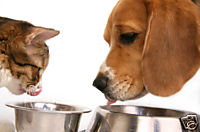 Loading... Please wait...
Loading... Please wait...Categories
Popular Brands
Our Newsletter
- Home
- 10 Tips to Ensure Proper Care of Senior Pets
10 Tips to Ensure Proper Care of Senior Pets
1. Know when your pet is a “senior” Different sources vary on this, but  according to the American Veterinarian Medical Association, by age two, most pets have already reached adulthood. By age five, they are considered middle age, and at the age of seven, they’ve started their senior years. Dogs, especially the larger breeds, begin the aging process a lot sooner, and should be treated as a senior after reaching three-four years of age. Remember, all pets age differently, so there is no set age that your pet is a senior.
according to the American Veterinarian Medical Association, by age two, most pets have already reached adulthood. By age five, they are considered middle age, and at the age of seven, they’ve started their senior years. Dogs, especially the larger breeds, begin the aging process a lot sooner, and should be treated as a senior after reaching three-four years of age. Remember, all pets age differently, so there is no set age that your pet is a senior.
Veterinarians suggest that supplements and vitamins can be served at any age, and provide an easily digestible, highly palatable diet addition to the regular diet. Giant dog breeds that are seniors will benefit from receiving supplements/vitamins at three years of age, while smaller senior dogs will benefit if supplements/vitamins are added at age five. Supplements/Vitamins can benefit senior cats at seven years of age.
2. Make quick checks a daily routine Check your pet’s teeth for loose or missing teeth, bad breath and inflamed gums. Brush your pet’s coat regularly to stimulate the skin and remove loose hair. Check for lumps that might have formed since the last brushing. Pay attention to your pet’s movements. If he or she is getting up slower, or limping, notify your vet.
3. Seniors need high quality, easily digestible food and plenty of fresh water Nutrition is of utmost importance! Older pets may experience a loss of appetite, and they need the correct balance of protein and nutrition in order to help maintain their best possible health and weight. Diets can treat disease or metabolic conditions, but they can include prescription diets that may not be highly palatable.
Some supplements/vitamins products are pleasant-tasting enhancers that will not greatly affect the diet to which they are being added. For animals that refuse to eat or cannot eat solid foods, the Sure products, by PetAg provide a complete balanced diet that has been carefully formulated to provide high quality protein, resulting in the animal maintaining more body mass and healthy immune and enzyme systems.
4. Watch your pet’s waistline! Reportedly, 25 percent of pets in the U.S. are overweight. Obesity leads to many health-threatening conditions that can lead to shorter life spans. Adverse affects common in older, overweight pets include an increased risk of developing diabetes and cardiovascular disease, and decreased immune competence. Metabolism in dogs drops by up to 30 percent, and that drop in metabolism contributes to pet weight problems.
5. Schedule veterinarian visits at least twice a year Remember, pets age faster than humans, so a visit to the vet once a year is like visiting your doctor or dentist once every seven years. Make sure that your pet’s vaccinations are updated on a regular schedule since seniors’ immune systems are not as competent as when they were younger.
6. Vitamins and minerals should suit aging bodies and metabolisms Adjusting these elements to fit the needs of senior animals can improve their overall health. For instance, as animals age there is a decreased need for calcium and phosphorus. If reduced, there is less stress to eliminate from the body. Additionally, an increased need for vitamins results in improved health, body function and immunity. Like humans, the benefits of an increased supply of antioxidants helps to decrease free radicals present that can have an effect on a number of body systems.
7. Adjust levels of exercise While obesity can be treated with a combination of exercise and diet, older pets may have ailments, such as painful arthritis, that are aggravated by extensive exercise. Be watchful and alert to these conditions. Products with glucosamine and chondroitin have been shown to help ease a pet’s discomfort. One product available is Grand Meadows grand mobility with glucosamine.
8. Older cats are more sensitive to noise As cats age, they may become more sensitive to noise and fearful of loud noises, especially if they’re arthritic. Try to provide older cats a quiet place to hide or rest comfortably. They also may need a larger bed to sleep in because they cannot curl up into a tight ball any longer.
9. Give your pet a massage Older pets like and benefit from a soft, full body massage. This may help the pet relax while you have another chance to check for lumps.
10. Give your pet a warm place to sleep As animals age they become more sensitive to cold. Provide them with a soft comfortable bed in a warm, draft-free area away from foot traffic. Both cats and dogs will appreciate being able to be warm and comfortable. Warm outerwear further protects dogs that must go outdoors during cold weather months.
We hope that you have found this guide to be of help to you and your "best friend"!

















